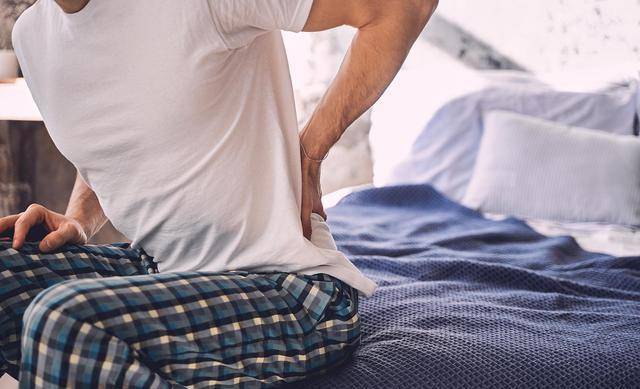We know that if marriage goes astray, it can have serious consequences on our lives. Similarly, when a lumbar disc “strays,” it also has a serious impact on our lives, directly affecting marital life.
Mr. Zhou, 40 years old, is a senior executive in a company. Prolonged sitting has led to him developing lumbar disc herniation. Doctors advised him to rest in bed. After resting in bed for a few days, Mr. Zhou felt much better. In the evening, unable to resist, he engaged in marital relations with his wife. However, as they indulged, Mr. Zhou suddenly felt intense pain in his lower back, as if his back had fractured, and he was writhing in agony.
His wife was extremely frightened at the time and immediately called the doctor for help. The doctor examined Mr. Zhou and said that the exacerbation of his back pain was due to vigorous activity.
Lumbar disc herniation is a common condition affecting the lumbar region. It refers to the protrusion of the outer edge and contents inside the dura of the lumbar disc into the lumbar vertebrae gap, potentially affecting the vertebral artery, vertebral nerve roots, and other spinal structures.
Symptoms of lumbar disc herniation include lower back pain, stiffness, limited movement, numbness in the lower extremities, tremors in the lower back, etc. If the symptoms worsen, it may lead to strong contractions in the lower back, accompanied by pain, and even paralysis of the lower extremities.
What causes lumbar disc herniation?
Firstly, excessive use of the lower back can cause lumbar disc herniation. This is because the movements of the lower back could subject the lumbar disc to excessive pressure, leading to its deformation. Activities such as bending forward and lifting heavy objects during exercise may lead to lumbar disc herniation.
Secondly, obesity can also lead to lumbar disc herniation. Obesity increases the load on the lower back, subjecting the lumbar disc to excessive pressure, thus causing lumbar disc herniation.
In addition, a lack of activity in the lower back can also lead to lumbar disc herniation. Lack of activity can cause the muscles in the lower back to atrophy, increasing pressure on the lumbar disc and resulting in lumbar disc herniation.
Lastly, some genetic factors may also contribute to lumbar disc herniation. Certain genetic factors may weaken the lumbar disc, making it more susceptible to external factors and leading to lumbar disc herniation.
Why does lumbar disc herniation affect sexual performance?
Firstly, lumbar disc herniation can cause structural deformation of the lumbar vertebrae, affecting their function. The function of the lumbar vertebrae is to support the spinal column, body weight, body movements, and the stability of the lower back, and lumbar disc herniation can affect the function of the lumbar vertebrae, thereby affecting the stability and mobility of the lower back.
Secondly, lumbar disc herniation can damage the tissues and nerve structures around the lumbar vertebrae, affecting lower back pain and mobility. Lumbar disc herniation can compress the tissues and nerve structures around the lumbar vertebrae, causing pain and affecting the mobility of the lower back.
Lastly, lumbar disc herniation can cause lower back pain, thereby affecting the mobility of the lower back. Pain can affect the mobility of the lower back, preventing patients from normal movement and thus affecting sexual performance.
Does lumbar disc herniation cause difficulty in urination?
The occurrence of lumbar disc herniation can compress the lumbar vertebrae and surrounding tissues, including muscles, blood vessels, nerves, and lymphatic vessels. Lumbar disc herniation can affect urination function by compressing the bladder nerves, leading to impaired bladder function.
In addition, lumbar disc herniation can alter the structure of the lumbar vertebrae, affecting their mobility, limiting urination function, especially causing obstruction in urination.
Furthermore, lumbar disc herniation can affect the function of the lumbar vertebrae, resulting in weakened muscle strength and flexibility, leading to obstruction in urination.
Therefore, lumbar disc herniation can cause difficulty in urination, and patients are advised to seek medical attention early to alleviate symptoms and restore normal urination function.
There are many treatment methods for lumbar disc herniation, here are a few:
1. Medication Treatment
1. Nonsteroidal anti-inflammatory drugs: By inhibiting the inflammatory response, they relieve pain and reduce the symptoms of lumbar disc herniation;
2. Analgesics: By acting as pain relievers, they alleviate pain and reduce the symptoms of lumbar disc herniation;
3. Muscle relaxants: By relaxing muscles, they alleviate the symptoms of lumbar disc herniation.
2. Physical Therapy
1. Lumbar massage: By massaging the lumbar region, it relieves muscle tension, reducing symptoms of lumbar disc herniation;
2. Lumbar correction: By correcting lumbar alignment, it reduces the symptoms of lumbar disc herniation;
3. Heat therapy: By applying heat, it improves blood circulation, relieves pain, and reduces symptoms of lumbar disc herniation.
3. Surgical Treatment
1. Lumbar disc discectomy: By removing the lumbar disc, it reduces the symptoms of lumbar disc herniation;
2. Lumbar disc interbody implantation: By implanting interbody material, it reduces the symptoms of lumbar disc herniation;
3. Lumbar disc intradiscal injection: By injecting medication into the disc, it relieves pain, and reduces symptoms of lumbar disc herniation.


